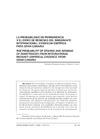Identificador persistente para citar o vincular este elemento:
https://accedacris.ulpgc.es/jspui/handle/10553/23150
| Campo DC | Valor | idioma |
|---|---|---|
| dc.contributor.author | Hernández Alemán, Anastasia | en_US |
| dc.contributor.author | León González, Carmelo Javier | en_US |
| dc.date.accessioned | 2017-08-17T02:31:04Z | - |
| dc.date.accessioned | 2018-03-15T14:29:37Z | - |
| dc.date.available | 2017-08-17T02:31:04Z | - |
| dc.date.available | 2018-03-15T14:29:37Z | - |
| dc.date.issued | 2011 | en_US |
| dc.identifier.issn | 1138-5774 | en_US |
| dc.identifier.other | Dialnet | - |
| dc.identifier.other | WoS | - |
| dc.identifier.uri | https://accedacris.ulpgc.es/handle/10553/23150 | - |
| dc.description.abstract | En este trabajo se analiza la influencia de las características personales y familiares, además de la renta laboral, en la intención de permanencia definitiva del inmigrante internacional en Canarias. Se presta especial atención al papel que ejercen los antecedentes familiares en el destino en la decisión de permanencia definitiva y cómo afecta esta intención al envío de remesas a origen. Se plantea un modelo teórico que tomando como base la maximización de la función de utilidad familiar explica el comportamiento del migrante internacional. La evidencia empírica proviene de una muestra de inmigrantes extranjeros residentes en la isla de Gran Canaria. Los resultados permiten probar, por una parte, que la existencia de familiares en el destino y los años de estancia inciden positivamente en la intención de permanencia y, por otra parte, que los inmigrantes que tienen la intención de permanecer gastan como media más en consumo en el destino que los inmigrantes que no tienen la intención de permanecer. Circunstancia esta última que afecta al envío de remesas a origen. Este análisis tiene implicaciones tanto para la política de inmigración como para las economías de origen y de destino. | en_US |
| dc.description.abstract | This paper analyzes the influence of family, personal characteristics and labour income on immigrants' settlement intentions in the Canary Islands. Special attention is paid to the role played by family antecedents in the host country and its influence on remittance sending. We have developed a theoretical model that takes into account the maximization of the family's utility to explain the immigrant's behaviour. Empirical evidence is obtained from a sample of immigrants settled in the isle of Gran Canaria. The results demonstrate on one hand that the existence of family ties in Gran Canaria and the years of stay positively influence the permanent settlement intention. On the other hand, this group of immigrants' propensity to consume is higher than the propensity of those who do not show permanent settlement intention. This situation affects remittance transfer. Implications for both, immigration policies and economic consequences in origin and host countries are finally discussed. | en_US |
| dc.format | application/pdf | - |
| dc.language | spa | en_US |
| dc.relation.ispartof | Migraciones | en_US |
| dc.rights | by-nc-nd | - |
| dc.source | Migraciones [ISSN 1138-5774], n. 29, p. 95-126 (Junio 2011) | en_US |
| dc.subject | 53 Ciencias económicas | en_US |
| dc.subject | 52 Demografía | en_US |
| dc.subject.other | Migración internacional | - |
| dc.subject.other | Intención de permanencia | - |
| dc.subject.other | Remesas | - |
| dc.title | La probabilidad de permanencia y el envío de remesas del inmigrante internacional: evidencia empírica para Gran Canaria | en_US |
| dc.title.alternative | The probability of staying and sending of remittances from international migrant: empirical evidence from Gran Canaria | en_US |
| dc.type | info:eu-repo/semantics/article | en_US |
| dc.type | Article | en_US |
| dc.identifier.isi | 000420762200005 | - |
| dc.identifier.url | http://dialnet.unirioja.es/servlet/articulo?codigo=3682132 | - |
| dc.identifier.eissn | 2341-0833 | - |
| dc.description.lastpage | 126 | en_US |
| dc.identifier.issue | 29 | - |
| dc.description.firstpage | 95 | en_US |
| dc.relation.volume | 29 | en_US |
| dc.investigacion | Ciencias Sociales y Jurídicas | - |
| dc.rights.accessrights | info:eu-repo/semantics/openAccess | - |
| dc.type2 | Artículo | en_US |
| dc.contributor.daisngid | 5125721 | - |
| dc.contributor.daisngid | 597168 | - |
| dc.contributor.authordialnetid | 1770731 | - |
| dc.contributor.authordialnetid | 301872 | - |
| dc.identifier.dialnet | 3682132ARTREV | - |
| dc.description.numberofpages | 32 | en_US |
| dc.utils.revision | Sí | - |
| dc.contributor.wosstandard | WOS:Aleman, AH | - |
| dc.contributor.wosstandard | WOS:Leon, CJ | - |
| dc.date.coverdate | Junio 2011 | en_US |
| dc.identifier.ulpgc | Sí | es |
| dc.description.sjr | 0,121 | |
| dc.description.sjrq | Q4 | |
| dc.description.esci | ESCI | |
| dc.description.erihplus | ERIH PLUS | |
| item.fulltext | Con texto completo | - |
| item.grantfulltext | open | - |
| crisitem.author.dept | GIR TIDES: Economía, medioambiente, sostenibilidad y turismo | - |
| crisitem.author.dept | IU de Turismo y Desarrollo Económico Sostenible | - |
| crisitem.author.dept | GIR TIDES: Economía, medioambiente, sostenibilidad y turismo | - |
| crisitem.author.dept | IU de Turismo y Desarrollo Económico Sostenible | - |
| crisitem.author.dept | Departamento de Análisis Económico Aplicado | - |
| crisitem.author.orcid | 0000-0001-9451-4093 | - |
| crisitem.author.parentorg | IU de Turismo y Desarrollo Económico Sostenible | - |
| crisitem.author.parentorg | IU de Turismo y Desarrollo Económico Sostenible | - |
| crisitem.author.fullName | Hernández Alemán, Anastasia | - |
| crisitem.author.fullName | León González, Carmelo Javier | - |
| Colección: | Artículos | |
Visitas
24
actualizado el 11-ene-2026
Descargas
18
actualizado el 11-ene-2026
Google ScholarTM
Verifica
Comparte
Exporta metadatos
Los elementos en ULPGC accedaCRIS están protegidos por derechos de autor con todos los derechos reservados, a menos que se indique lo contrario.
